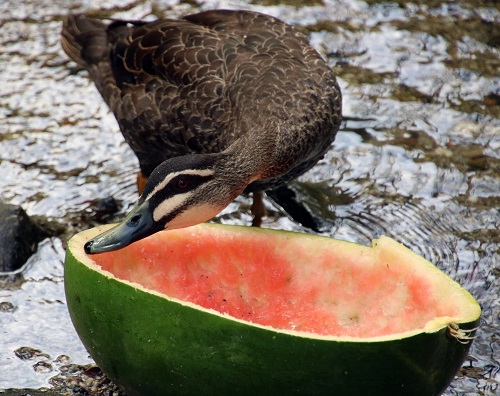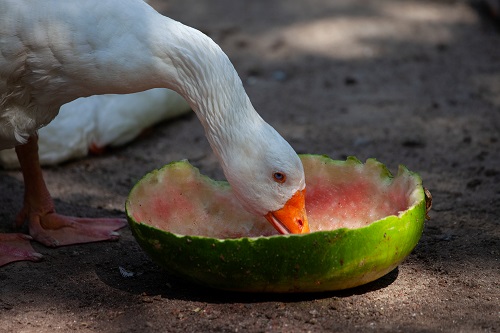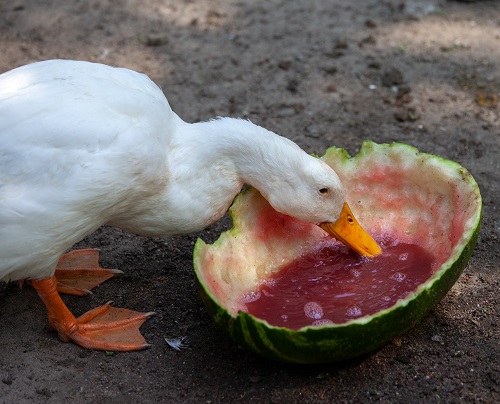Can Ducks Eat Watermelon? Would it be a good idea to feed this fruit to them? Keep on reading to get a detailed explanation!
Are you curious to know if you can share a slice of juicy watermelon with your feathered friends? You’re not alone! Many duck owners and enthusiasts wonder if this popular summer fruit is safe for ducks to consume. Keep scrolling to find out – Can Ducks Eat Watermelon, and how to offer it to your web-footed pals safely!
Read our article on Can Bearded Dragons Eat Purple Cabbage here
Can Ducks Eat Watermelon

If you have pet ducks or a backyard flock, you might wonder if it’s safe to feed them watermelon. The good news is – Yes, ducks can eat watermelon! This fruit is generally considered safe for ducks to consume and can be a refreshing treat, especially during hot summer days.
How to Offer Watermelon to Ducks
Feeding watermelon to ducks can be a delightful experience, but it’s important to do it right to ensure the safety and enjoyment of both the ducks and yourself. Here’s a step-by-step guide on how to offer watermelon to ducks:
1. Choose Fresh Watermelon
Start by selecting a ripe and fresh watermelon. Avoid watermelons with signs of mold or spoilage. Quality matters when it comes to the well-being of the ducks.
2. Prepare the Watermelon
Wash the watermelon thoroughly under running water to remove any dirt, chemicals, or contaminants from the surface. Ducks, like any creatures, appreciate clean food.
Confused about whether dogs eat papaya or not? Click here to find out!
3. Slice into Duck-Friendly Portions
Use a clean knife and cutting board to slice the watermelon into small, bite-sized pieces. Ducks have relatively small beaks, so smaller pieces are easier for them to handle.
4. Feed in Moderation
Remember that watermelon should be an occasional treat rather than a significant part of their diet. Ducks require a balanced diet that includes grains, vegetables, and aquatic plants.
Dos and Don’ts of Feeding Ducks Watermelon
To ensure the well-being of ducks and maintain a healthy environment, follow these dos and don’ts when feeding them watermelon:
Dos
- Cut Into Small Pieces: Always cut the watermelon into small, manageable pieces. This reduces the risk of choking and makes it easier for ducks to eat.
- Remove Seeds: Be sure to remove all seeds from the watermelon pieces. Seeds can pose a choking hazard.
- Provide Fresh and Clean Watermelon: Ducks, like any other creatures, appreciate fresh and clean food. Rinse the watermelon to remove dirt or contaminants before offering it.
- Feed in Moderation: Offer watermelon as an occasional treat. Ducks require a balanced diet that includes grains, vegetables, and aquatic plants.
Read our latest article on What to Feed a Venus Fly Trap here
Don’ts
- Avoid Processed Varieties: Stick to plain, natural watermelon. Do not offer ducks watermelon with added sugars, artificial flavors, or any processed versions.
- Don’t Overfeed: Feeding ducks too much watermelon or any treat can lead to health issues. Balance treats with their regular diet.
- Respect Natural Habitats: Feed ducks near clean water sources, such as ponds or lakes, and avoid crowded areas where overfeeding can occur. Respect local regulations regarding feeding wildlife.
Potential Risks of Overfeeding Watermelon

Overfeeding watermelon to ducks, while it may seem like a delightful treat, comes with certain risks that duck caregivers should be aware of. Ducks should receive a well-balanced diet, and overindulging in watermelon can lead to several potential risks:
- Nutritional Imbalance: Ducks require a diverse diet to meet their nutritional needs. Overfeeding watermelon may lead to an imbalance in their diet, as it lacks many essential nutrients they need to thrive.
- Obesity: Watermelon, like many fruits, contains natural sugars. Excessive consumption of sugary foods, including watermelon, can contribute to obesity in ducks. Obese ducks are at higher risk of health problems.
- Digestive Issues: Ducks have sensitive digestive systems. Consuming too much watermelon can lead to digestive discomfort, including diarrhea or indigestion.
- Choking Hazard: Ducks tend to eat quickly and may swallow food without thorough chewing. Feeding them large pieces of watermelon without access to water can pose a choking hazard.
Click here to Learn if Snake Plants are Toxic to Dogs.
FAQS-Can Ducks Eat Watermelon
Q1. Can Ducks Eat Watermelon Rinds?
Answer: Ducks can indeed eat watermelon rinds, but they might find them less appealing than the juicy flesh. It’s safe to offer rinds, but most ducks prefer the inner part.
Q2. Is Watermelon Safe for Ducklings?
Answer: Watermelon is generally safe for ducklings, but it’s essential to provide it in small, manageable pieces to avoid choking hazards. Start with small amounts to ensure they can digest it without any issues.
Q3. Should I Remove Watermelon Seeds Before Feeding Ducks?
Answer: Yes, it’s a good idea to remove watermelon seeds before feeding ducks. While they may not harm ducks in small quantities, removing seeds helps prevent any potential choking hazards.
Q4. How Often Can I Feed Ducks Watermelon?
Answer: Watermelon should be given as an occasional treat rather than a regular part of a duck’s diet. Feeding ducks watermelon once or twice a week is a reasonable frequency.



